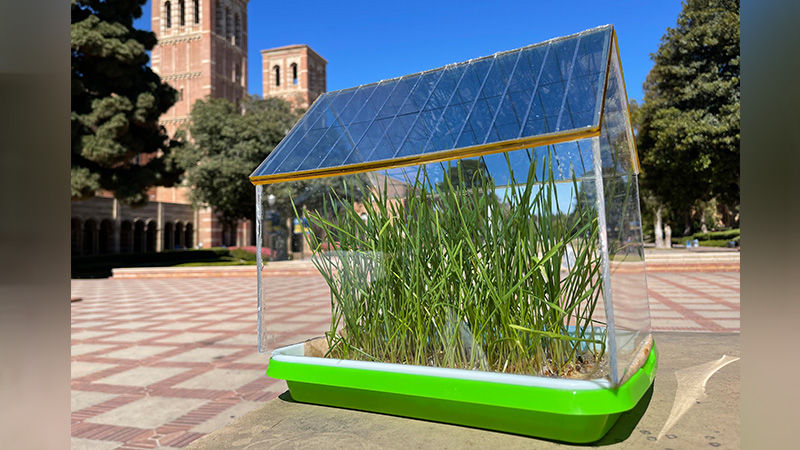- Joined
- May 11, 2013
- Posts
- 24,890
- Reaction score
- 13,614
- Points
- 2,755
- Location
- Morganton, N.C.
- Website
- conversations-ii.freeforums.net
UCLA: UCLA Engineers Design Solar Roofs to Harvest Energy for Greenhouses


Mar 6, 2023 - UCLA Samueli Newsroom
As countries around the globe seek sustainable energy sources and the U.S. endeavors to become a net-zero emissions economy by 2050, renewable energy sources such as solar panels are in high demand.
However, solar panels can take up significant space and are often difficult to scale. Enter the new field of agrivoltaics, which focuses on the simultaneous use of land for both solar power generation and agriculture. For example, replacing the glass in greenhouses with solar panels could power the lamps and water controls in the greenhouse, or even the whole farm. But how does one build solar panels that can absorb energy from sunlight without blocking the light that plants need?
UCLA Samueli School of Engineering’s materials scientist Yang Yang and his team have designed just such a device. In a study published today in Nature Sustainability, they explore a new, viable application of solar cells that does not require large plots of land.
The team has developed a strategy for augmenting semi-transparent organic solar cells. These cells rely upon carbon-based materials, as opposed to the inorganic substances in conventional devices. The investigators incorporated a layer of a naturally occurring chemical called L-glutathione, which is sold as an antioxidant dietary supplement over the counter, and found that the addition extended the solar cells’ lifetime, improved their efficiency, and still allowed adequate sunlight to reach plants in a greenhouse prototype about the size of a small dollhouse. “Organic materials are uniquely suitable for agrivoltaics because of their light-absorption selectivity,” said Yang, who also has a faculty appointment in bioengineering and holds UCLA’s Carol and Lawrence E. Tannas Jr. Chair in Engineering. “The main drawback that has prevented their widespread use up to now is their lack of stability.”
Organic solar cells tend to degrade more quickly than their inorganic counterparts because sunlight can cause organic materials to oxidize and thus lose electrons. The researchers found that the additional layer of the L-glutathione prevented the other materials in the solar cell from oxidizing, which resulted in the organic cells maintaining more than 80% efficiency after 1,000 hours of continuous use — as opposed to less than 20% without the added layer.
The research team also tracked the growth of common crops including wheat, mung beans and broccoli in two separate demonstrations. One had a transparent glass roof with segments of inorganic solar cells, and the other had a roof made entirely from semi-transparent organic solar cells. The crops in the greenhouse with the organic solar roof grew more than the crops in a regular greenhouse. The scientists believe this is because the L-glutathione layer blocked ultraviolet rays, which can inhibit plant growth, and infrared rays, which can cause greenhouses to overheat and plants inside to require more water. “We didn’t expect the organic solar cells to outperform a conventional glass-roof greenhouse,” said Yepin Zhao, the lead author of the research and a UCLA postdoctoral scholar in Yang’s lab. “But we repeated the experiments multiple times with the same results and after further research and analysis, we discovered that plants don’t need as much sunlight to grow as we’d originally thought. In fact, too much sun exposure can do more harm than good, especially in climates such as California’s, where sunlight is more abundant.”
On the heels of these findings, the team has established a startup at UCLA that aims to scale up production of the organic solar cells for industrial use. The researchers said they hope to make environmentally friendly greenhouses that incorporate the organic solar cells commercially available in the future.
Co-authors of the study from UCLA Samueli’s Materials Science and Engineering Department are Zongqi Li, Dong Meng, Wenxin Yang, Xinyao Wang, Qiyu Xing, Bin Chang, Yifan Zhou, Elizabeth Zhang, Ran Zheng, Kung-Hwa Wei and Elizabeth G. Scott, who is also affiliated with Columbia University. Other co-authors are Ken Houk, a UCLA Chemistry and Biochemistry professor; Ilhan Yavuz of Marmara University in Turkey; Caner Deger, who is affiliated with UCLA and Marmara University; Miroslav Peric of California State University, Northridge; as well as Minhuan Wang, Yanfeng Yin, Jiming Bian and Yantao Shi from Dalian University of Technology in China.
This research was supported by a grant from the California Energy Commission, with additional support from the National Center for High Performance Computing of Turkey. Individual authors also received support from the National Natural Science Foundation of China, the China Postdoctoral Science Foundation and the U.S. National Science Foundation.
